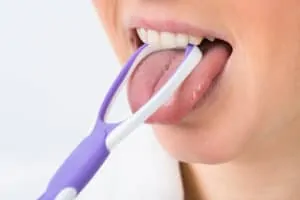 You will hear your dentist in El Paso talk a lot about how important it is to brush and floss your teeth every day to protect your teeth and keep your mouth healthy. But did you know that you should also brush your tongue as well as your teeth? The truth is, people who don’t brush their tongue regularly are putting their teeth and overall oral health at risk.
You will hear your dentist in El Paso talk a lot about how important it is to brush and floss your teeth every day to protect your teeth and keep your mouth healthy. But did you know that you should also brush your tongue as well as your teeth? The truth is, people who don’t brush their tongue regularly are putting their teeth and overall oral health at risk.
Our tongues may not seem that fascinating, but to your dentist in El Paso, these muscles are actually quite interesting and important. Not only are our tongues one of the strongest muscles in our bodies, but they also help us do many useful, everyday tasks such as speak, chew, and swallow. Tongues also have about 10,000 taste buds that allow us to taste every bit of our favorite foods. But these taste buds are also really great places for bacteria to hide. If those bacteria are not removed regularly, they can start to negatively affect oral health.
Our tongues are made up of tons of tiny bumps called papillae. These papillae create peaks and valleys on our tongues and give bacteria the perfect place to settle. If the bacteria aren’t removed, you may experience some unwanted side effects. Let’s take a look at a few.
Bad Breath – One of the most common side effects of not brushing your tongue is bad breath. While bad breath can be caused by a lot of different things, an unclean tongue can be to blame.
Decreased Sense of Taste – Everyone loves to eat their favorite foods because they taste good. But when a tongue is not properly cared for, bacteria can coat our taste buds and decrease our sense of taste. This means that our favorite foods may not taste quite as good as they once did.
Black, Hairy Tongue – Even though this sounds scary and gross, black, hairy tongue is a very real thing that can occur from not brushing your tongue. This discoloration happens when food and drink particles aren’t removed from the surface of the tongue and essentially stain those tiny papillae. It should go away on its own once you get into the tongue-brushing habit.
Gum Disease – Since our tongues are in contact with our teeth throughout the day, everything on our tongues can easily transfer onto our teeth. When tongue bacteria move to the teeth, it can cause decay and, if left untreated, progress into gum disease. Gum disease is a serious oral health condition that can cause tooth loss if not treated.
It’s important to brush your tongue every time you brush your teeth. This will give you the cleanest mouth. You don’t need to scrub your tongue hard, and truth be told you shouldn’t. A gentle brushing from the back of the tongue to the front and from side-to-side will do just fine. However, patients with a strong gag reflex may have trouble with this method. If this is the case, try using a tongue scraper that you can buy at any pharmacy. It’s just as effective as brushing but may not trigger the gag reflex as much as a toothbrush.
Brushing your tongue is a crucial step in making sure you’re caring for your overall oral health as well as possible. Of course, seeing your dentist in El Paso at least every six months is also necessary.
He was excellent and pulled my wisdom tooth in less than 2 min. w/o chipping it. The service was good too.
Great dentist experience! While they do take my insurance, unfortunately, they are not part of my network, however, I liked them so much I will continue to see them.
We were very impressed with the helpful and friendly staff at this dental office.
I was very impressed and thankful with the service provided.
I’m 60 years old and I hated to go to the dentist, and put off going for a long time. But let me tell you Dr. Rizk is the best dentist I’ve ever had. I would of gone years ago. A no pain Dr. – thank you!
I frequently talk to my patients about the different types of dental crowns available to restore their teeth. Understanding the different crown materials available helps you make an informed decision about your dental care. Let me share my professional insights about your various crown options and help you determine which... Read More...
As a dentist practicing in El Paso, I often discuss dental crown cost without insurance with my patients. I understand that cost considerations play a significant role in dental treatment decisions, and I believe in providing transparent information about pricing and payment options. The dental crown cost without insurance typically... Read More...